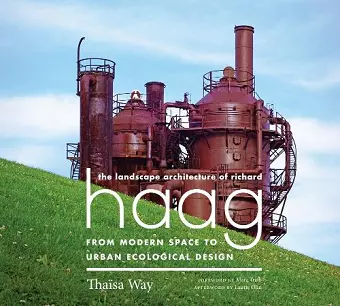The Landscape Architecture of Richard Haag
From Modern Space to Urban Ecological Design
Format:Hardback
Publisher:University of Washington Press
Published:1st May '15
Currently unavailable, and unfortunately no date known when it will be back
This hardback is available in another edition too:
- Paperback£31.00(9780295746463)

Thaisa Way has filled a conspicuous gap in the history of landscape architecture in the United States. Her well-researched combination of insightful biographical narrative and perceptive case studies illuminates the core values informing the brilliant and enduring accomplishments of Richard Haag as designer, educator, and political activist. -- Reuben Rainey, University of Virginia Although Seattle's Gas Works Park is a well-recognized project throughout the world, few people are aware that Richard Haag, an accomplished landscape architect, designed this modern masterpiece. Way's book fills a gap in design literature with her examination of Haag's design work and its contribution to twentieth-century design. She also addresses his role as a challenging and imaginative educator of leading landscape architects who, inspired by his creative and poetic insights, pursued their own significant careers. The book is a 'must read' for anyone interested in modern landscape design. -- Linda Jewell, UC Berkeley Well known for his masterpieces, the pioneering Gas Works Park and the inspiring Bloedel Reserve, landscape historian Thaisa Way explores the depth and breadth of Richard Haag's designs and his skill as a civic advocate, exponent of an emerging ecological aesthetic, and founder of the University of Washington landscape architecture department. Influenced by a deep encounter with Japan, his career profoundly impacted the landscape of the Pacific Northwest. Haag had an astute understanding of forces of nature; Way shows how Haag is one as well. -- Kenneth Helphand, University of Oregon Thaisa Way has given us a wonderfully readable exposition of Richard Haag, the man and his practice, that is able to address the cultural and professional milieu of his evolution, as well as a sophisticated exploration of Haag's design sensibility and its manifestation in built landscapes. This is just the kind of perceptive exploration of the development of contemporary ideas in landscape design to inspire scholars, practitioners and enthusiasts. -- Elizabeth Mossop, Spackman Mossop Michaels Way's research has prepared her well as an interpreter of Haag's residential design, public work, and very importantly, post-industrial landscape remediation. She documents the evolution of his design practice and theory, his influences and influence, and very interestingly, the history of the founding department of landscape architecture at the University of Washington. -- Therese O'Malley, associate dean, Center for Advanced Study in the Visual Arts, National Gallery of Art
Richard Haag is best known for his rehabilitation of Gas Works Park in Seattle and for a series of remarkable gardens at the Bloedel Reserve on Bainbridge Island. He reshaped the field of landscape architecture as a designer, teacher, and activist. In 1964, Haag founded the landscape architecture department at the University of Washington, and his innovative work contributed to the increasingly significant design approach known as urban ecological design, which encourages thinking beyond the boundaries of gardens and parks to consider the broader roles that landscapes play within urban ecosystems, such as storm water drainage and wildlife habitat.
Gas Works Park is studied in every survey of twentieth-century landscape architecture as a modern work that challenged the tenets of modernism by engaging a toxic site and celebrating an industrial past. Haag’s work with ecologists and soil scientists in his landscape remediation and reclamation projects opened new areas of inquiry into the adaptive reuse of post-industrial sites.
Thaïsa Way places Haag’s work within the context of changes in the practice of landscape architecture over the past five decades in the Pacific Northwest and nationally. The book should be of interest to specialists as well as to readers who are interested in the changes in urban landscapes inspired by Haag’s work.
Watch the book trailer: https://www.youtube.com/watch?v=fUBeOCA8-kQ
"While the book tells Haag's story, it also describes the evolution of landscape architecture in the Northwest."
* Columns *"Since 1964, when he founded the Department of Landscape Architecture at the University of Washington, Haag has gained a warranted admiration that Way has sharply surveyed and illustrated in her new book."
-- Paul Dorpat * Pacific NW Magazine *"This very detailed work is most useful for professionals. The book brings new attention to Pacific Northwest landscape design. Recommended."
* ChoiISBN: 9780295994482
Dimensions: unknown
Weight: 1111g
248 pages